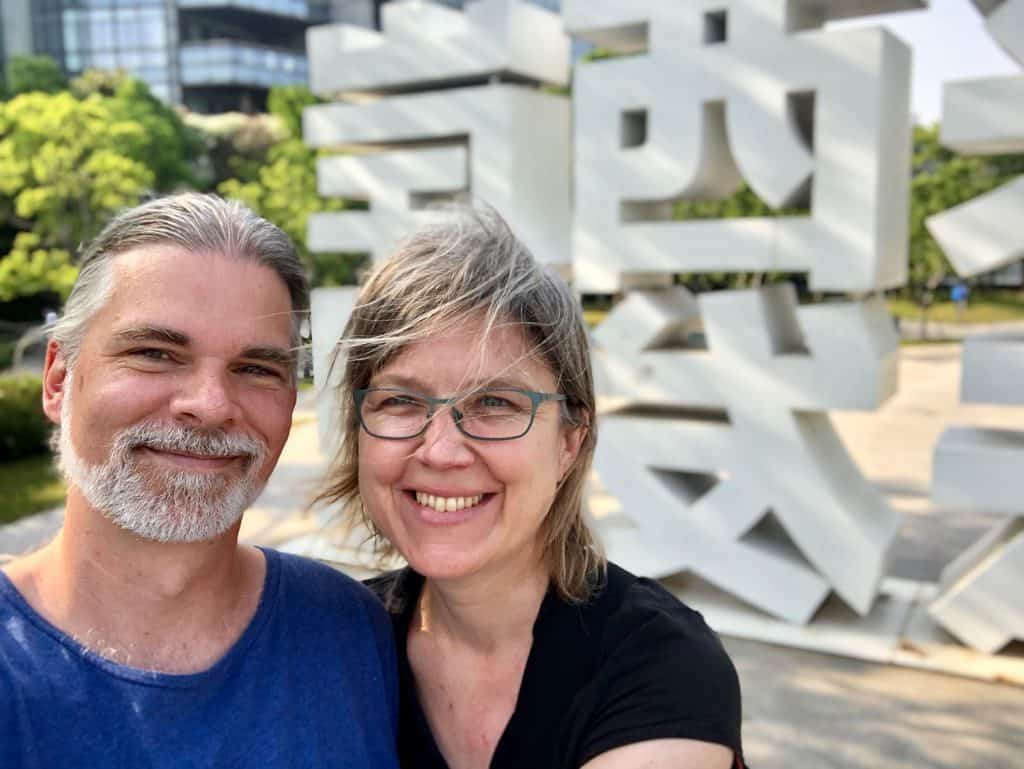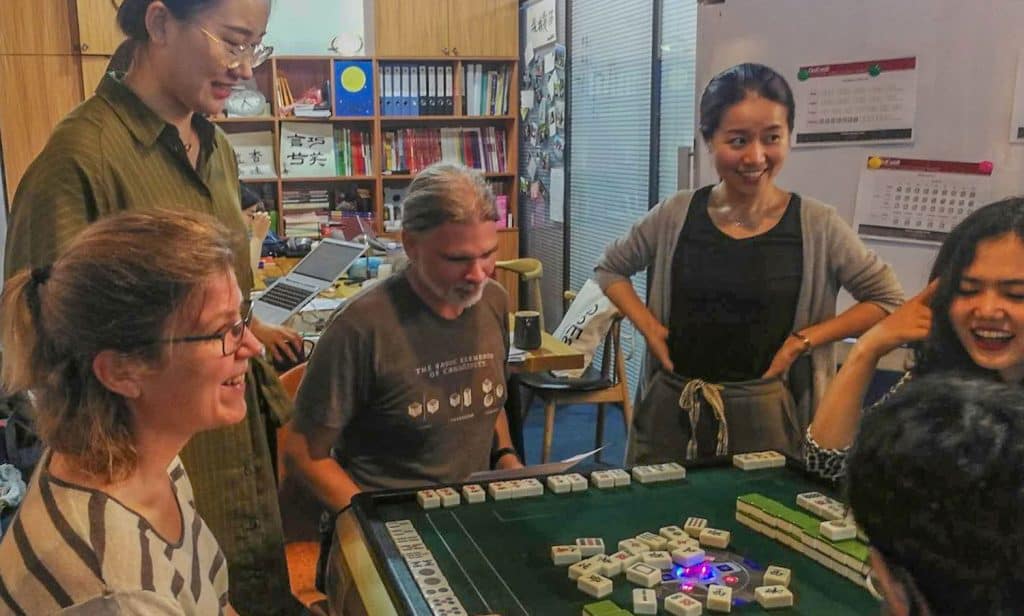Mattijs & Annemieke learn Chinese in Shanghai
Name: Mattijs, Annemieke
Nationality: Dutch
Time in China: 4 weeks (10 weeks total)
Chinese level: Beginner (HSK 2)
Other languages: Dutch (native), English, German, French
GoEast teachers: Dana Chen 陈乔丹 and Sophia Suo 索菲娅
Favorite Chinese phrase: 好啊 (hǎo ā! excellent!)
Two students, Mattijs and Annemieke, came to GoEast in late May from the Netherlands. Together, the mid-40s-year-old couple is taking a 9-month sabbatical from their respective jobs as a manager for a criminal forensics team and a software engineer for the insurance industry. So why did they choose to spend 10 weeks in Shanghai learning Chinese?
Why did you come to China to learn Mandarin?
Mattijs: The reason for us to do a sabbatical is that we’ve been in our jobs quite a long time, 15 years. So we wanted to take a step back and do different stuff; mostly stuff we had always wanted to do but also to get out of our comfort zone.
I think it was [Annemieke] that came up with the idea to maybe learn Chinese. And then we were thinking where to go, probably Shanghai because we like big cities and thought it would be a bit easier than Beijing, from what we heard—more international and things like that. So we looked around for where we could do this and ended up here [at GoEast].
How did your family and friends react to this plan?
Annemieke: I think everybody was very enthusiastic. A lot of people say, “Oh! I want to do that.” But somehow they expect if you take a sabbatical you’re just going to travel the world, so they ask you, “Ok, so where are you going? Which countries are you going to?” Well, uh, just one. So they think you take the whole period to travel and travel and travel, but that’s not our idea. We just mainly want to do different things that you normally don’t do in work. So like speaking Chinese.
So why did you choose to learn Chinese specifically?
Annemieke: Because it’s like totally different. If you’re doing the same job for a long time, then it can be quite refreshing to just do something totally different […] I guess you normally don’t learn that much new stuff. So yeah, it’s rewarding.
How much time do you spend in Chinese class?
Annemieke: 3 hours, 5 days a week. So 15 hours a week.
And then do you do homework or study outside of class as well?
Annemieke: Yeah, yeah, yeah. About two hours I think [a day].
Mattijs: We’re a bit older so it doesn’t stick as it should. Repeat, repeat.
Annemieke: Because we do it every day it’s quite good because you don’t have to think about it. You’re just going, going. Next day again, next day again. But now in our class I guess we know everything about each other because we keep on asking each other, “So what do you like to eat? Which sports do you like? Do you like to go shopping?”
Are you able to use what you learn outside of class around Shanghai?
Annemieke: Not that much yet. It takes a lot longer than I expected, but we try. Sometimes they understand you in one go but often they just don’t get what you’re saying. It’s still hard to speak it, which is always the hardest part in any language. So here, during the breaks, sometimes, we try a little bit. But otherwise we don’t have that much opportunity to speak Chinese.
Mattijs: I think it’s going to increase quickly now because we’re starting to get a bit more confidence and just using it even though we make loads of mistakes. And we’re getting into more practical stuff… We like food so we just learn the symbols for these things and learn all the stuff you need in a restaurant. So maybe we’ll use it a bit more now.
What’s it like living in Shanghai for 10 weeks?
Annemieke: It’s more foreign than I thought.
Mattijs: Your first impression is it’s quite Western, actually. But when you get down to the details, it’s very different. The first week was exhausting because you try to set up like a regular life, to buy stuff, understand how things work. Everything took an effort to understand. It’s getting better now.
Annemieke: Well I thought it was amazing how little you know when you just go to a supermarket here and you’re just watching, like, “What is this? What is all of this?” It’s harder than I thought. Because everything is in Chinese and, well, we don’t know any characters… The first time you [Mattijs] wanted to make some food yourself at home, so we tried to find out, ok, which is the soy, which is the vinegar.
Will you continue learning Chinese when you return home?
M: Well that’s one thing I’m very curious to see, how I’m going to continue with this. There is a Chinatown in the city we’re from. Before we left I had this moment when I was in the subway and there were some Chinese people talking. I could never imagine that when I come back I would be able to understand what they were talking about.





